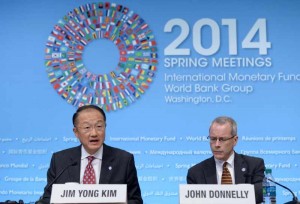 The World Bank said India’s GDP is likely to expand by 5.6 percent this fiscal.
The World Bank said India’s GDP is likely to expand by 5.6 percent this fiscal.
The World Bank’s “India Development Update” released here said: “India’s economic growth is expected to rise to 5.6 percent in FY15, followed by further acceleration to 6.4 percent and 7 percent in FY 2016 and FY 2017.”
It said identifying the goods and services tax (GST) as the most important economic reform that the new government should undertake for faster growth.
It added: “Implementing the GST will transform India into a common market, eliminate inefficient tax cascading, and go a long way in boosting the manufacturing sector.”
It said that dismantling inter-state check posts by implementing the indirect tax reform will help India grow faster.
The bank said: “High variability and unpredictability in shipments add to total logistics costs in the form of higher than optimal buffer stocks and lost sales, pushing logistics costs in India to 2-3 times international benchmarks.”
Denis Medvedev, Senior Country Economist, World Bank, India said: “The transformational impact of reform, particularly if enhanced by a systematic dismantling of inter-state check posts, can dramatically boost competitiveness and help offset both domestic and external risks to the outlook.”
Onno Ruhl, World Bank country director in India, said: “The government’s efforts at improving the performance of the manufacturing sector will lead to more jobs for young Indian women and men.”
The projections could, however, face risks from external shocks, including financial market disruptions caused by changes in monetary policy in high-income countries, slower global growth, higher oil prices, and adverse investor sentiment arising out of geo-political tensions in the Middle East and Eastern Europe, the bank said.
It said growth has rebounded significantly due to a strong industrial recovery.
The update said: “Capital flows are back, signalling growing investor confidence as inflation has moderated from double digits, exchange rate has stabilised, and financial sector stress has plateaued.”